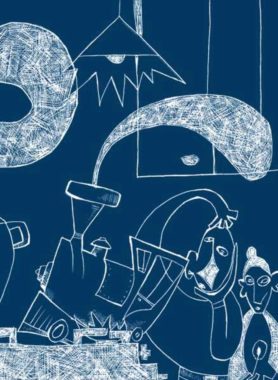
Those who think that the only wish of a fat woman is to get into a size 0 should fall into Alice’s story. The protagonist of Le ciccione lo fanno sempre meglio (Fatty girls always do it better, Baldini Dalai Editions), sequel of the lucky Le ciccione lo fanno meglio (Fatty girls do it better), reappears on the beat-up Mercedes she use to run away from her wedding and lands on the sands of a beach in No-Wonder-Land, surrounded by junkies, trans, drag queens, much alcohol and tasteless relationships. Among the “three lelle” friends/enemies, the womanizer ex-true love now dead and condemned to be her guardian angel, echoes of sirens, the famous and gay lover and the pusher in love, the sharp pen of Caterina Cavina allows you travel with Alice in a ramshackle universe between realism and hyper-realism.
Alice, by existing, is a constant kick in the teeth to do-gooders. She is “nasty, dirty and bad” and even a little debauched, in a society where obese women receive nothing but looks of pity. It is well-known for who is struggling among fat and extra pounds: flab should not be shown. The role of fatty girl is that of a costar in other people lives, the one that should only exist and be noticed as less as possible, friend to everybody, nice, available, that has to say thank you for being considered, that must aim to find a good man who goes beyond weight handicap and grant her what every woman basically should want: a family and children.
There it is, Alice’s adventures are a nice middle finger to prejudice. They show that extra pounds are not stigmata but a feature like hair color and that anyone who lies on the consolatory thought “if I were slim my life would be different” is wrong. “Just think how nice she would be if she lose weight” is banned from her life, Alice is beautiful, even when she dresses like Moira Orfei to serve highly alcoholic drinks at the “Sea Witch” or like a “stuffed guinea fowl” on her wedding day, when she dresses like a freak or when making love, flab in the air, on a putrid mattress in a closet, she is beautiful because she lives everything on her skin and searches her way of life. And, in the end, cyclically, she gets on the beat-up Mercedes and succeeds in choosing the best for her.
Alice lives and not merely exists, and this is as good as a person, fat or thin, black or white, good or bad, can do. The linear, raw and no-frills style of Caterina Cavina prevents from putting the book down from start to finish and helps in imagining each scene, so that it is natural to ask why we still do not talk about taking Alice’s stories to the big screen.
www.fermoeditore.it
 English
English  Italiano
Italiano 



